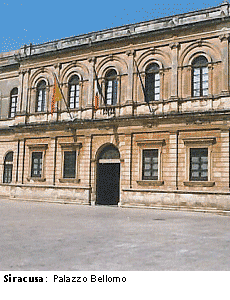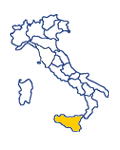Saturday, 20 April 24 - 02:24 am
 |
|

 |
|
|
|
|

Siracusa Hotels

Reserve Siracusa Hotels: save up 70% on rooms!
Compare offers & book on line at hotel's web sites. |
|

|
|
Siracusa Guide Italy
History and culture
|
|
|
|
|
History and culture
Siracusa was founded by Greek colonies in 734 B.C. The city grew at a rapid rate, giving life to a series of internal conflicts and creating the ideal atmosphere for tyranny.
In 485 B.C. Gerone, the first tyrant of Siracusa came to power. Through his policy of conquests and victories, the importance of Siracusa grew, making the city strong and famous as a ruling power. In spite of these conquests, however, the Siracusa people rebelled against tyranny and drove out his successor, the tyrant Gerone, and then set up a democracy (466 B.C.).
After fighting and beating the Athens fleet (413 B.C.), Siracusa then had to defend itself against the expansionist ambitions of another city, the powerful Carthage. The city placed itself under the protection of the tyrant Dionysius in order to survive and he then began a plan to fortify the city, which was completed by his successors.
Under the reign of Ierone II (269-215 B.C.) Siracusa enjoyed a period of peace and splendor, that was the last before the city lost its independence and liberty after it was conquered by the Roman Empire. Siracusa fell under Roman rule in 212 B.C., in spite of the strong contribution made to their battles by the war inventions created by the famous Archimedes. This was the beginning of the city’s decline.
When the Roman Empire fell in 476 A.D., the city was at the mercy of other populations: in 493 was sacked by the Goths and then in 535 A.D. it was conquered by Belisarius and annexed to the Byzantine Empire.
In 878 the Arabs took over a large part of Eastern Sicily including Siracusa, and the city stayed in their hands for about 2 centuries.
The Byzantines took over from the Arabs for a brief period (1038) but they were soon replaced by the Normans (1081), who managed to hold onto power for more than a century.
In 1209 the Swabians ruled by Frederick II took over the city. After the Swabians it was the turn of the Spanish who occupied the city in the 14th century and built several fortresses and defense walls around the city.
A tremendous earthquake shook the East of Sicily in 1693, including Siracusa and the other cities in the Val di Noto area. The city was completely rebuilt in the early decades of the eighteenth century and thus became one of the best examples of the Sicilian Baroque style together with the nearby Noto.
Between 1800 and 1900, Siracusa enjoyed a period of economic, urban and cultural expansion, greatly helped by the fact that it was annexed to the Kingdom of Italy (1870).
Go to directories of Web Sites
|
|
|
|
|
Acquista la tua visibilità su Travel Plan
|
|
|
|





